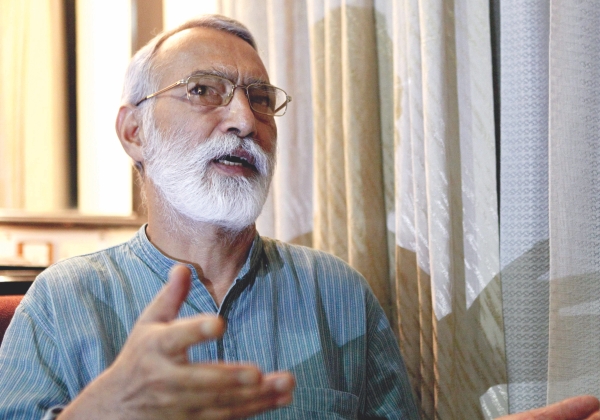| Home - Back Issues - The Team - Contact Us |
 |
| Volume 10 |Issue 41 | October 28, 2011 | |
|
|
Interview The 'Give Back' Strategy Winner of the Magsaysay Award for Community Leadership in 2009, Deep Joshi, an Indian social worker and NGO activist, has been a champion of developing rural communities. He co-founded a non-profit organisation called Professional Assistance for Development Action (PRADAN) of which he was the Executive Director till 2007. HASAN JAHID TUSHER How have you, an MIT graduate, become engaged in social activism, then becoming a National Security Adviser in the government? If more professional people did what these doctors were doing we could bring changes, we could remove poverty-- that's what inspired me, in a way that was kind of my calling at others like me who have the privilege of good education and can go and work in villages. That's how I began to work and basically that is what the inspiration was - to start an NGO that I have been working for many years. My NGO, Pradan, brings educated people to work in villages. We work in seven of the poorest states across the central India. I have retired from Pradan now. We have a retirement age of 60. When I turned 60 in 2007, I retired. Every year Pradan people will go to 60-70 difference campuses including agricultural universities, engineering colleges, social science universities, and would select people to come and join. There is an elaborate process of selection. Case study, group discussion, interview and anybody who has had either a bachelor’s degree in any of the courses or a masters degree in social sciences are recruited. Once they are recruited, there is a one-year apprenticeship programme, they are placed to a Pradan project where a senior person is designated to guide. Once they join the organisation as an apprentice, they have to spend one month living in a house of a poor family in a remote village and understand how poor people live and experience poverty.
Who are the members of the National Advisory Council and what does it do? There are people from NGOs. Generally eminent citizens who have achieved something, such as artists or scientists– these kinds of people. They are not the politicians. They are not elected from any political party. They are highly qualified and respected persons. It's a mix of people from different fields of life who have in some ways done something notable. They are known to the people, they are concerned about social issues, concerned about poverty and social justice. What are the roles of the National Advisory Council? There are already major flagship schemes of the government for example, the employment guaranty and the right to information. These are major things that have not passed in seven or eight years. So we will see how to improve their functioning. So these are the three things—we work on social policies in general, work on themes that the president had identified, and also see the implementation already existing flagship schemes. For things we did, we helped drafting the national food security bill, which is right now before the parliament. We helped to draft another law 'land acquisition and rehabilitation' that is also before the parliament right now. And many other things including how the Right to Information Act could be improved further, we try to see. We are working on how to improve the function of national rural employment guaranty programme and several other similar things. Does the government listen to the National Advisory Council's suggestions? Do the NAC members hold any office, status or enjoy power? Like Bangladesh, does the civil society sometimes play a crucial role on major issues in India? I think, in this time when poverty seems to be a huge problem, which the government alone cannot solve. There are so many issues concerning environment, poverty, inequality, which the government alone cannot deal with. I would have expected the government to be much more supportive of civil society for example regarding laws on taxation. There are various ways the government could be more supportive, more forthcoming of helping the civil society to function effectively. I think there is much more that they can do which they are not doing. The writer is a Senior Reporter, The Daily Star.
Copyright
(R) thedailystar.net 2011 |
